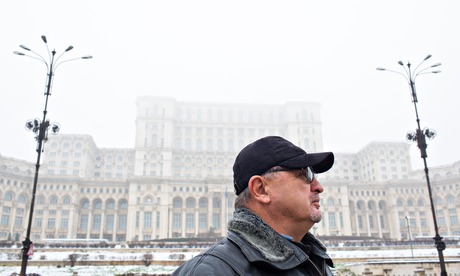‘I’m still nervous,’ says soldier who shot Nicolae Ceausescu

On Christmas Day, 1989 he guarded the couple’s melodramatic show trial, led them out as Ceausescu sang the Internationale and his less-composed wife screamed “fuck you” at a mocking sergeant, lined them up against a wall then strafed them with bullets from his Kalashnikov.
It happened so quickly that a military journalist videoing the trial captured only the last round of bullets and the crumpled bodies on the floor. But those few seconds have shadowed the ageing paratrooper’s whole life.
“I still get nervous talking about this,” he says, cradling a glass of brandy. “It’s two lives that I ended. It is a big deal. In a war it’s OK, but when you kill unarmed people it’s more difficult. I wouldn’t wish this on anyone, even though my job is killing people.”
Bulky, mustachioed, and anxiously alert in grainy video of the trial, he has expanded into a rotund grandfather who has no regrets about putting a definitive end to Ceausescu’s regime of fear, poverty and deprivation. His family were among millions persecuted.
“My grandfather was a priest, a liberal, he was in prison for a lot of his life,” Boyeru said. “He was really happy after those events, happy that the regime had changed, that Ceausescu died, and he told me, ‘Don’t worry, I take all your sins upon myself.’”
Being one of the last century’s most famous executioners came at a heavy price. It cost him his privacy, his peace and his marriage to a woman worried about his gruesome fame.
Boyeru believes his bullets killed both Ceausescus because, when he started shooting, one member of the three-person firing squad froze for several seconds and the second had forgotten to put his weapon on an automatic setting so squeezed out only a few individual shots.
The couple, “still very much in love”, had asked to die together in defiance of a sentence that ordered separate executions. He granted their last wish, and takes some consolation from killing them before they could break down.
“I shot them very fast. I feel I helped them to die with dignity.” He half expected to feel the thud of bullets into his own back seconds later, from a heavy machine gun stationed behind them, “clearing up” the men responsible for the audacious execution.
Romanians of his generation, educated in communist theory at school and human cruelty in their daily lives, can still be matter-of-fact about the price of political turmoil. “Any revolution demands blood. And also the revolution eats its heroes. You cannot forget this,” he says with a shrug.
Boyeru was 31, an officer in an elite unit of paratroopers, when he volunteered for a mystery Christmas mission. They only got their orders minutes before meeting a cologne-soaked Nicolae Ceausescu, who had been absolute ruler just days earlier. “The minister asked me, ‘Captain, can you do this?’ I said, ‘Yes’. What could I say?”
Romania was spiralling into chaos, one of the last Soviet satellite states in eastern Europe to throw off its communist leadership. Boyeru’s unit had secretly followed an unfolding revolution on Radio Free Europe, which was nicknamed the “little lizard”, perhaps because it was banned but still slipped through cracks in the propaganda edifice.
On 21 December, the whole unit had been forced to swear loyalty to the man Boyeru would kill within a week. “They made us sign a statement saying we didn’t agree with what was happening, and vowing we would support and protect Ceausescu.”
The next day they watched in shock as the grey Central Committee building, seat of communist power, was taken over by protesters and Ceausescu and his wife fled by helicopter.
Continuing on The Guardian
